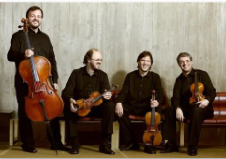After sending the news of going to the Shanghai concert of the Ballodine String Quartet to the circle of friends, I applauded that there are more women than men. At halftime, the beginners who were dragged half way by the relatively difficult chamber music were also encouraged by women: the best performance was in the second half. “Your joy and expectations have made me sip my lips and enjoy myself. We have a secret code for Alexander Borodin: We all fell in love with him through Nocturne.”.
The first time I heard Baoluoding’s “Nocturne” was on a radio station in Shanghai that specializes in playing classical music. It was late November 2009, when autumn was at the end and winter was still waiting for Ai Ai. In this season of Shanghai, fog was most likely to form and the clear sky would always become blurred in an instant. “A piece of” Nocturne “starts with the first theme played on the cello, goes to the first violin response theme, and then to four strings that emphasize the theme of” Nocturne “with various musical means. In just over 10 minutes, I looked out of the window at the moon, which was just clearly outlined, and it was already hazy.”. Is it also because those who listen to “Nocturne” already have tears in their eyes?
Alexander Borodin was born in St. Petersburg, Russia, on November 12, 1833. This serious professional chemist, who was willing to devote all his spare time to music, earned a nickname: Sunday Composer. Although he is a Sunday composer, his works are not inferior to those of the eight classical composers, ranging from quantity to quality, to the symphonic poem “On the Grassland of Central Asia” and the opera “Prince Igor”. However, perhaps the most familiar and beloved work among ordinary musicians is “Nocturne”, a work written by Paul Ding to thank his wife for her 20 years of company as a gift for her 20th anniversary wedding anniversary.
Shanghai will hold a concert of the Ballodine String Quartet on May 21st, which is very interesting. It seems to be trying to tell people who hastily confessed the day before using the “May 20th” date that true love can be fragrant even after 20 years of wind, rain, and snow. The concert brought “Nocturne” back to “String Quartet No. 2 in D Major” by Borodin, allowing us to hear the complete transition of the work. In addition, we also saw that even the Borodin String Quartet, which has traveled extensively for decades, even played this work by Borodin countless times, also spent more time adjusting emotions than other movements when it was about to start the third movement, namely “Nocturne”. Good orchestras are like this. Although technology is the foundation of their existence, they will never put the cart before the horse, allowing technology to overshadow emotions. So, how good is the Ballodine String Quartet? This quartet, founded in 1945, has undergone several personnel changes for various reasons over the past 72 years. However, performing the work “according to the mood of the performer at the time” (in the language of Igor Naidin, one of the members) has always been the “baton” of the Ballodin quartet. Therefore, when the cello, like Ballodin himself, tenderly confides its concern to his wife, you can also avoid suppressing emotions in public; However, when the first violin seemed to respond gently to her husband’s care, it seemed that none of the music fans at the scene would care about their surroundings and let themselves burst into tears.
In this concert, the Balodin String Quartet has prepared a total of four works for fans. In addition to Alexander Balodin’s “String Quartet No. 2 in D Major”, there are Beethoven’s “String Quartet No. 6 in B Major”, Schubert’s “Quartet in C Minor”, and Shostakovich’s “String Quartet No. 11 in F Minor”. Let’s leave aside the works of two German and Austrian composers, and let’s say the works of Schostakovich, a composer of the same ancestry as Borodin.
Shostakovich’s work “String Quartet No. 11 in F minor” was created in 1966 to commemorate his friend and recently deceased violinist friend Silinsky. The first time I listened to it, and this time I listened on the spot, it was even more so. It reminded me of the “First Cello Concerto” written by Shostakovich as a friend and cellist Rostropovich in 1959. I always felt that there were hidden similarities between the two works: the same horrific footsteps, the same composer’s own heart beat that could not be controlled by fear… Only seven years later, Shostakovich’s expression became more anxious, “Mingming is a Requiem for a good friend. The 18 minute long composition uses seven movements, displaying restless hyperactivity, causing the listener to feel restless and itchy. It can be imagined that Shostakovich was in a restless mood when creating this” String Quartet No. 11 in F minor. “”.
From the birth of Borodin’s “String Quartet No. 2 in D Major” to the creation of “String Quartet No. 11 in F Minor” by Shostakovich in 1966, the changes of the century have made it difficult to reproduce the warm and sweet feelings in the works of Borodin’s descendants, Shostakovich. Of course, in terms of the texture of music, Borodin’s works are far from being as thick and pliable as Shostakovich’s. However, as a music enthusiast who only wants to walk peacefully in this world, I don’t want Shostakovich to trade his tortuous and difficult life for his rich and profound music castle. Just say love, and don’t “wind, wind, fire, fire, and fire, our love is like a war” (lyrics from “General Love”). Just want someone to be able to wait for you without undue desire, and turn the love of your heart into a serenade.

